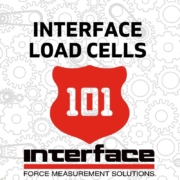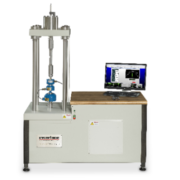How Are Load Cells Used for Weighing?
 Load cells support modern weighing systems. These transducers convert mechanical force (weight) into electrical signals that can be processed and displayed as weight measurements.
Load cells support modern weighing systems. These transducers convert mechanical force (weight) into electrical signals that can be processed and displayed as weight measurements.
Strain gage load cells are the most common type of load cell used for weighing applications. Load cells measure weight using strain gage technology. Interface strain gage load cells offer a precise, efficient, and reliable method for converting weight into measurable electrical signals, making them indispensable in modern weighing technology. Learn more about viable strain gage load cell and instrumentation solutions in our Weighing Solutions Guide.
How Do Load Cells Measure Weight?
Here’s a step-by-step overview of how load cells work in measuring weight:
- When weight is applied to a load cell, it exerts a force on a metal or composite structure. This structure is designed to deform slightly under the applied load.
- Small devices known as strain gages measure deformation attached to the structural element. For more information, read Strain Gages 101.
- The strain gage deforms as the load cell structure deforms under the weight. This deformation changes their electrical resistance, which works on the principle that it changes in response to mechanical strain.
- The change in resistance is detected and converted into an electrical signal. This is usually done using a Wheatstone bridge circuit, which measures small changes in resistance very accurately.
- The electrical signal, proportional to the deformation amount, is then amplified and converted into a digital signal by the load cell’s signal-processing electronics.
- The digital signal is processed to calculate the weight based on the load cell’s specifications and calibration.
- The final weight measurement is output as a digital readout or can be sent to a computer or control system, such as a weight indicator, for further processing, display, or logging.
In summary, strain gages change their resistance when subjected to mechanical strain. Deformation occurs when weight is applied to a load cell, which causes strain gages to change resistance—deformation changes in the strain gage resistance result in a measurable electrical signal. Electronic circuitry amplifies and processes this signal to produce a weight reading.
Why Choose Load Cells for Weighing?
Load cells are standard for weighing in many industries due to several key advantages:
- High Accuracy and Precision: Strain gages are incredibly sensitive to minute changes in resistance, allowing for precise weight measurements. This makes them suitable for both heavy-duty industrial applications and delicate laboratory scales.
- Reliability and Durability: Interface load cells are designed for durability to withstand repetitive and heavy loads. They offer long service life with regular calibration services.
- Versatility: Strain gage load cells can be configured in various designs (compression, tension, universal) and models to accommodate various weighing applications, from small-scale laboratory equipment to large industrial scales.
- Linearity: The relationship between the applied load and the output signal is highly linear, ensuring consistent and accurate measurements across the entire weighing range.
- Repeatability: Load cells consistently produce the same output for the same applied load, making them ideal for quality control and process monitoring.
- Compatibility: Strain gage load cells are compatible with various electronic weighing indicators and data acquisition systems, enabling easy integration into modern weighing systems.
Load cells are prevalent in weighing applications. Industrial industries use load cells to weigh raw materials, finished products, and process materials. Food and agriculture-related industries use load cell scales for farming, harvesting, packaging, and grocery scales. Check out High Accuracy Load Cell Solutions For Trustworthy Scales.
Truck scales, axle load meters, and weigh-in-motion systems use load cell scales, and medical equipment such as patient weighing, infusion pumps, and other medical devices need the accuracy of precision load cells.
If you want a durable and accurate weighing solution, read more in Interface Weighing Solutions and Complete Systems. Our team is also ready to recommend products suitable for your specific weighing application.
Additional Resources
Load Cells For Smarter And More Efficient Weighing
Weighing Your Options Webinar Recap
Load Cells Maximize Weighbridge Performance
Silo And Tank Measurement Solutions
New Interface Case Study Exams Weighing And Scales
Inventive Agriculture Monitoring And Weighing Solutions
SPI Low Capacity Platform Scale Load Cell
SPI High Capacity Platform Scale Load Cell
WSSCLC-MOUNT Weighing Assembly








